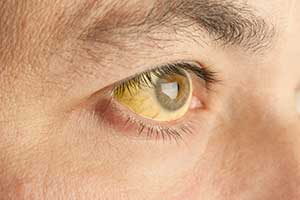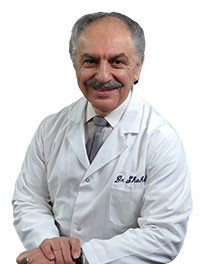Jaundice Treatment in Midland Park, NJ
What Is Jaundice?

Jaundice, also known as icterus, is a term used to describe the yellowing of the skin and eyes. There are three different types of jaundice that can occur in adults:
- Pre-hepatic jaundice, which can be the result of any number of conditions that cause red blood cell breakdown
- Intra-hepatic jaundice, or hepatocellular jaundice, which results from liver damage
- Post-hepatic jaundice, or obstructive jaundice, is the result of an obstruction in the bile duct
Jaundice can also occur in newborns and occurs because the liver has not matured enough to remove bilirubin - a yellow compound that is a product of the breakdown of aged red blood cells - from the bloodstream. This is particularly common in newborns that were not carried to term.
Most cases of jaundice in adults can be treated by addressing the underlying condition with medication. Since some conditions that can cause jaundice are more serious than others, it is always important to see a medical professional if you experience any symptoms.
To schedule a consultation with a healthcare practitioner in Midland Park who specializes in jaundice treatment, call (201) 806-6099 or contact Dr. M.T. Shahab online.
Causes of Jaundice
Bilirubin is a yellow compound that is a product of red blood cell death and breakdown. When bilirubin is first produced, it is insoluble (not dissolvable) in water, so in order to leave the body, it must first be processed to make it soluble. This process happens in the liver, after which the bilirubin leaves the body in bile or urine.
Disruptions in this normal process can cause hyperbilirubinemia, or the build-up of bilirubin in the blood, and that extra bilirubin can leak into the body and cause the tissues to turn yellow.
A wide variety of conditions can cause hyperbilirubinemia and result in jaundice. Pre-hepatic jaundice is caused by excessive hemolysis, or destruction of red blood cells. Conditions that can cause pre-hepatic jaundice include malaria and hemolytic uremic syndrome. Hereditary conditions that can also cause this kind of jaundice include:
- Spherocytosis
- Thalassemia
- Sickle cell anemia
- Glucose 6-phosphate dehydrogenase deficiency
Liver damage, which can lead to hepatocellular jaundice, can be caused by hepatitis A, B, C, D, and E. While all forms of hepatitis can cause temporary liver inflammation, types B and C can cause chronic inflammation. Cirrhosis, or the replacement of healthy liver tissue with scar tissue, can progress slowly and eventually cause jaundice.
Other causes of hepatocellular jaundice include:
- Inflammation caused by toxins or medication side effects
- Alcohol hepatitis, caused by excessive drinking
- Gilbert's syndrome, a common hereditary disease
In obstructive jaundice, side-effects of medicines like methotrexate and testosterone can affect the bile ducts. Other causes of gallbladder or bile duct blockage include:
- Gallstones, caused by bile forming into stones
- Pancreatic or gallbladder cancer
- Biliary atresia, or inflammation of the bile ducts
- Pancreatitis, or inflammation of the pancreas
Excess consumption of beta-carotene, which is found in carrots, pumpkin, and cantaloupe, can also cause a harmless form of jaundice called pseudojaundice.
Risk Factors of Jaundice
There are risk factors that can also increase your chance of developing jaundice, including certain actions or situations with a high risk of hepatic contamination. These include:
- Eating raw shellfish
- Having unprotected sex
- Living, traveling or working in an area where hepatitis is widespread
- Sharing razor blades, needles and toothbrushes
- Having a blood transfusion before 1992
Certain diseases can also increase the risk of developing jaundice. These include:
- Diabetes
- Thyroid disease
- Ulcerative colitis
- Dubin-Johnson Syndrome
- Rotor's Syndrome
- Crigler-Najjar Syndrome
Symptoms of Jaundice
The most common and easily identifiable symptom of jaundice is the yellowing of tissue. The whites of the eyes are usually the first to change color, and as the amount of bilirubin increases, the skin turns yellow too.
Other jaundice symptoms can include:
- Pruritis (itchiness)
- Fatigue
- Weight loss
- Vomiting
- Pale stools
- Dark urine
Serious complications that warrant immediate medical attention include:
- Fever or flu-like symptoms
- Bloody or black stool
- Blood in the vomit
- Pain due to high bilirubin concentrations
- Easy bruising that looks like a reddish-purple rash
- Severe abdominal pain, which can be a sign of a blocked bile duct
- Pruritis so intense that patients scratch off their own skin, or have insomnia or suicidal thoughts
Contact your healthcare provider immediately if you experience yellowing eyes, skin, or any other symptoms of jaundice.
Diagnosis
There are many different ways to diagnose jaundice. Healthcare professionals will most likely take a detailed medical history and use a physical exam to feel for tumors in the abdomen and check the firmness of your liver.
Other tests may be performed, the first of which will likely be a liver function test. Blood tests that can be used include:
- Hepatitis A, B, and C tests
- Blood cultures to identify infections
- Complete blood count (CBC) to measure the level of each blood cell type
Imaging tests that can identify hepatocellular and obstruction jaundice include:
- Ultrasonography
- Computed tomography (CT)
- Magnetic resonance imaging (MRI)
- Endoscopic retrograde cholangiopancreatography (ERCP)
Sometimes a liver biopsy or laparoscopy is necessary to check for inflammation, cirrhosis, cancer, or fatty liver disease. In a biopsy, a tissue sample of the liver is taken for lab analysis, while in laparoscopy, a viewing tube is inserted into the navel to check the liver and gallbladder.
Treatment for Jaundice
Jaundice treatment involves addressing the underlying cause of the condition, which can include:
- Reducing alcohol consumption
- Receiving vaccinations against hepatitis A and B
- Taking cholestyramine to treat itching
- Discontinuing medication that causes jaundice
- Treating anemia by taking iron supplements or changing the diet to include more iron-rich food
- Performing an endoscopic retrograde cholangiopancreatography procedure (ERCP) to remove an obstruction from the bile ducts
You should never ignore signs of jaundice, as several of the diseases that can cause yellow skin and eyes are potentially life-threatening. To schedule an appointment with a jaundice specialist in Midland Park, call (201) 806-6099 or contact Dr. M.T. Shahab online.
Medwell Orthopedics & Functional Medicine for Men & Women
Address
33 Central AveMidland Park, NJ 07432
(201) 806-6099
www.BergenCountyDoctors.com
Hours
Mon:
8:00 am - 8:00 pm
Tue:
2:00 pm - 7:00 pm
Wed:
8:00 am - 6:30 pm
Thu:
8:00 am - 1:00 pm
Fri:
8:00 am - 6:30 pm
Sat:
9:00 am - 1:00 pm
Sun:
By Appointment Only


